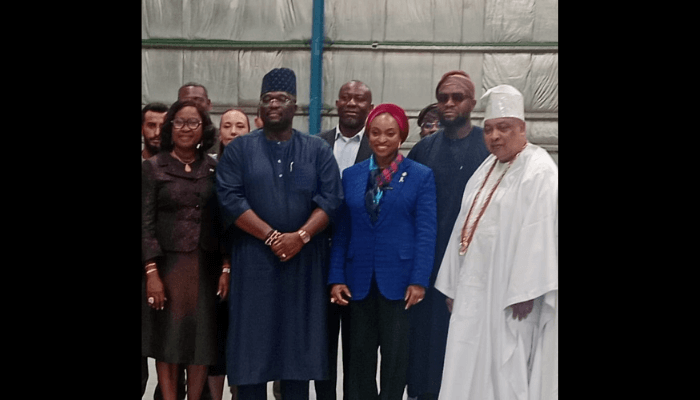Coleman launches fibre optic cable factory to power Nigeria’s digital economy
L-R: Yemisi Edun, MD, FCMB; George Onafowokan, managing director Coleman Technical Industries Limited; Jumoke Oduwole, minister of Industry, Trade and Investment and Oba Babatunde Ajayi, Oba Akarigbo of Remo at the 50th anniversary celebration and commissioning of the African largest Fibre Optic Cables and Africa first reinforced plastic production factory at Sagamu, Ogun State recently.
…FG to partner Coleman on deployment of 90,000km of fibre optic cables – Minister
… Tinubu congratulates Coleman on 50th anniversary, urges group to scale made in Nigeria
Coleman Technical Industries Limited, Nigerian wires and cables manufacturer, has launched a 9 million kilometers Fibre Optic cable factory in Sagamu, Ogun state.
The event, which also doubled as the 50th anniversary of the firm, brought together government officials, industry leaders and stakeholders across the telecommunications and oil and gas industries in a celebration of vision and resilience.
George Onafowokan, managing director, Coleman Industries Limited, explained that the realization of the vision is the result of years of strategy, bold risk-taking, and the relentless pursuit of efficiency and excellence.
Recalling how he was asked by his father, Asiwaju Solomon Onafowokan, the founder and chairman, CTIL, to take over as CEO and managing director, alongside his brother who is the executive director, he said they were initially uncertain about the future but were motivated by their father’s conviction and trust in their ability to grow the company.
He said: “From a modest 200 sqm factory in Idimu, which we expanded to 2,000 sqm, with no further expansion possible. In 2009, Coleman moved to Arepo, a 20,000 sqm plant that was later doubled to 40,000 sqm.”
By 2014, the first factory in Sagamu, which is now over 350,000sqm, was commissioned.
This plant introduced Nigeria’s first medium- and high-voltage cable production line. With Arepo 1, 2 and 3; Sagamu Plants 2 through 5 now developed, Coleman stands today as one of Africa’s largest cable manufacturing hubs, an extraordinary leap from 2000 sqm to over 400,000 sqm combined in less than 15 years, he said.
The Sagamu factory, which also houses a copper and aluminium smelting plant with a 3,000 tons smelting capacity for aluminium and a 10,000 tons smelting capacity of copper per month, will culminate in job creation while scaling local availability of essential infrastructure for the telecommunications, oil and gas and power industries amongst others.
With its increased capacity, he expressed optimism that with continued support of government, financial institutions, and stakeholders, Coleman is on track to become a N15 trillion ($10 billion) revenue enterprise from local and export-generated revenue.
Read also: Coleman returns to CPs market for N50bn from series 3 & 4 issuance
Onafowokan, who is also the chairperson, Manufacturers Association of Nigeria, Ogun state chapter, appealed to the federal government to expedite approval of the 2025 fiscal measuring policy which, he said, is crucial for the manufacturing sector.
BusinessDay reports that approval of the 2025 Fiscal Measuring Policy will provide clearer tax incentives for manufacturers, encourage local sourcing of raw materials, outline clear fiscal incentives and credit support while benchmarking exchange rate for accurate financial planning.
He explained that the 9 million km fibre optic cable factory has already applied for Free Trade Zone status which he hopes will get a positive consideration following the approval of the 2025 Fiscal Measuring Policy.
He said: “To achieve some of our strategic visions and projections, we pray for the expeditious approval of the 2025 fiscal measuring policy, which is crucial for the manufacturing sector, as well as the review, positive consideration and approval of our Application for Free Trade Zone Status for our Sagamu Factory Expanse.
“The factory we are commissioning today is single-handedly the Largest Fibre Optic Cable Factory by capacity and the First Fibre-Reinforced Plastic (FRP) Manufacturing Factory in Africa today.
“Our next major project is already on the horizon: a $100 million Fibre Optic Cable Drawing Tower, designed to deepen local content, reduce imports, promote exports with a competitive advantage, and position Nigeria as Africa’s hub for fibre optic technology,” he said.
President Bola Ahmed Tinubu, in his remarks lauded Coleman Group for this momentous leap tasking the company to scale made in Nigeria across the world.
Tinubu, who was represented by Jumoke Oduwole, the minister of Industry, Trade and Investment, Jumoke Oduwole, said the factory represents the lifeline of Nigeria’s digital economy.
Read also: Coleman, West Africa largest cables producer shops for N25bn from Series 1 & 2 CP issuance
“It symbolizes the arteries through which data, opportunity, and innovation will flow across our nation. May this new chapter deliver greater innovation, deeper local content, broader exports, and thousands more dignified jobs,” the president said.
“Our message to you today is simple: scale made in Nigeria. Scale made in Nigeria to the world. The reward for hard work is more work and our policy posture through standards, alignments, faster certification, and investment facilitation will continue to reflect that clarity of purpose as we support you to achieve more,” he added.
On his part, the Bosun Tijani, minister of Communications and Digital Economy, stated that in line with President Tinubu’s digital transformation agenda and with financial partnership from the World Bank, the ministry will be partnering with Coleman to deploy 90,000km of fibre optic cable across the country.
He noted that the World Bank, which is the lead investor in that project, approved for the first time in its history, $500 million towards the project.
“Coleman is the only company that manufactures fibre optic cables in the whole of West Africa. To be able to deploy that fiber, we will need to train a lot of young people,” he noted.

